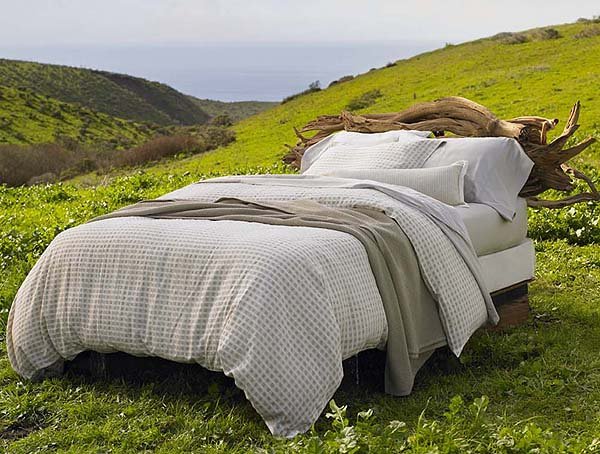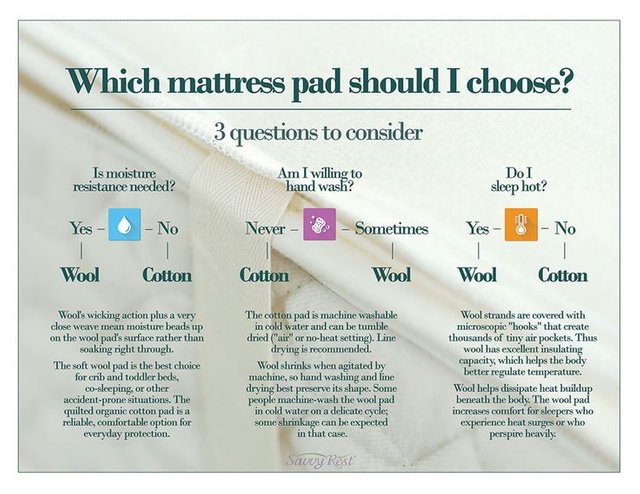Perhaps you don’t know much about organic bedding, but don’t worry! This article is meant to fill you in on all of the ins and outs and important details surrounding organic bedding - mattresses and pillows specifically. Take a look!

Organic bedding is made out of all-natural materials. This means that they are non-toxic and don’t contain any synthetic materials or harmful chemicals like arsenic, phosphorus, plastics, or polyurethane. Be aware that not all bedding labeled “green” or “eco-friendly” is necessarily 100% all-natural and organic. Be on the lookout for labels such as “certified organic” - this is what you want!
**Certified organic bedding is typically made up of a mixture of layers of natural cotton, wool, latex, and other organic materials. **There are so many different types and materials to choose from.
Organic mattresses and pillows are perfect for those with respiratory problems like asthma or allergies. There are also organic crib mattresses great for babies and young children with respiratory issues or trouble with sleeping.
Organic mattresses and pillows are extremely breathable. This allows you to keep cool during the summer months, and warm during the winter months.
There are two main types of organic mattresses: natural rubber mattresses and coil innerspring mattresses. Natural rubber mattresses have rubber cores, in which the rubber comes from a tree in Malaysia. Coil innerspring mattresses have metal coils on the inside, instead of rubber. In both cases, the inside is then surrounded by a layer of organic material (usually wool) for comfort, to regular moisture, and to act as a fire retardant.
There are affordable options for organic bedding. Although organic bedding is more expensive than conventional bedding, there are affordable options out there as well. While the natural latex and organic wool combination is one of the more expensive options, the organic cotton option is a bit more affordable.
These 10 makers of certified organic bedding offer a range of designs to suit every taste and budget.
White Lotus Home: Mattresses, Pillows, Bedding and Home Furnishings handmade in the USA.
Coyuchi: This Northern California company makes organic cotton bedding inspired by the natural world. Grown and processed in India, their cotton is certified organic by the Control Union Certifiers of the Netherlands, Global Organic Textile Standard (GOTS), and ECOCERT of France; and Fair Trade certified by FLO-CERT of Germany and ECOCERT of France. They also use low-impact dyes.
Plover Organic: Plover's colorful textiles are made from GOTS certified organic cotton and dyeing methods that conform to the Organic Trade Association's American Organic Fiber Processing Standards (AOFPS) and the Oeko-Tex Standard 100. The company also practices Fair Labor manufacturing in accordance with Social Accountability International's (SAI) SA8000 standard.
LOOP: Sustainability is the core value at LOOP, which aims "to educate the public on the ill-effects of conventional cotton growing, to help encourage the organic-choice, and to deliver products that will be enjoyed and cherished everyday." The company's textiles are GOTS certified, made without harsh chemicals, and are sweatshop free.
Pure Rest: Committed to "organic purity," Pure Rest displays the actual scans of all of its organic certifications on its website. The company's cotton sheets "exceed" GOTS standards, are SKAL certified organic (Netherlands), and made with fair trade certified labor. Its comforters are filled with certified organic wool.
Amenity: Founded by two graphic designers, Amenity marries nature and modern design, taking "a thoughtful and minimal approach to our production, leaving the lightest possible footprint." The company's bedding is made with GOTS certified organic cotton and eco-friendly dyes.
Boll and Branch: Their bedding is not only 100% certified organic, but their goods, made in India, are certified by Fair Trade to ensure the makers are paid and treated well. Additionally, a portion of every purchase is used to fight human trafficking.
Anna Sova: Anna Sova's luxurious bedding designs are all organic. The cotton sheets and duvet covers are made from SKAL certified organic cotton. Natural silk duvet covers are produced using fair labor practices and SKAL approved dyes and are free from chemical bleaches, azo or heavy metal dyes, and formaldehyde or silicone sizing.
Portico: Available at Bed Bath and Beyond stores and on Amazon, Portico's bedding is made from GOTS and Oeko-Tex Standard 100 certified organic cotton, inks, and dyes. It is also free of chlorine bleach, heavy metals, formaldehyde, aromatic solvents, and genetically modified organisms (GMO).
CB2: CB2's sheets are made from GOTS certified organic cotton, inks, and dyes. Read our review here; we are happy to report that we remain as smitten as we were eight months ago.
West Elm: Some, but not all, of West Elm's organic sheets, duvet covers, and blankets are labeled as GOTS certified. Certain bedding items are also non-dyed or made with environmentally-safe dyes that contain no harmful metals.

If you’re still not 100% sure about switching to organic bedding, stay tuned for our next few blogs that are sure to provide you with tons more helpful information. Once you decide to make the transition, you’ll wonder why you didn’t do it sooner… and there’s absolutely no doubt that you’ll ever return to traditional bedding!
Read more: Choosing the Best Mattress: An Experiment in Testing Whether Individuals Choose a Bed That Leads to Improved Sleep. by Sean O. Hogan, Jack D. Edinger, Gayle S. Bieler, and Andrew D. Krystal
I think this is so cool
Will continue to stay tuned
Downvoting a post can decrease pending rewards and make it less visible. Common reasons:
Submit
is certified organic cotton the same standards as food grade? i don't want to eat it. i just want to avoid qlyphosate drenched, gmo cotton. i have found other anomalies in organic standards that make me doubt. NEVER trust the FDA. cotton is not food or drugs so, who enforces organic cotton standards? USDA?
Downvoting a post can decrease pending rewards and make it less visible. Common reasons:
Submit